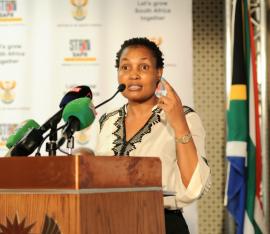
Government is forging ahead with the reinforcement of the code of conduct for councillors in an effort to address challenges, strengthen local government and look into motions of no confidence.
This is according to the Cooperative Governance and Traditional Affairs (CoGTA) Minister, Thembi Nkadimeng, who was updating the media on Wednesday on the state of local government.
“In the past two weeks, we’ve put in the code of conduct for councillors, this was as the result of what happened in the City of Tshwane and in the City of eThekwini where councillors physically attacked one another instead of sitting and debating about disagreements,” she said.
The code of conduct, according to Nkadimeng, zooms into measures that need to be applied jointly with the council if disruptions are the order of the day.
“We need to link with the thought of that we’re trying to micromanage but with the thought of instability. Because, if the meeting is disrupted, it means council can’t conclude on when the operations are supposed to be done and it gets to be postponed again and again,” she explained, adding that it was not only coalitions that are unstable.
The Minister has since called for political maturity.
“We also want to regulate on the motions of no confidence... There are critical areas on how they should come about, which are fraud, corruption and not providing service delivery. But it can’t be based on slight provocation, like not greeting and now you’re angry with party B.”
She shot down the view that government was trying to micromanage councils.
“From 2016 to 2021, Nelson Mandela Bay didn’t build a single RDP house. Not only that they didn’t have the money, they turned no less than R500 million back,” she said, adding that the metro had seen numerous mayors come and go within that period.
However, Nkadimeng said these interventions are driven by the desire to protect citizens.
“It's fair and well for the parties to win elections and govern how they want. But we need to protect citizens who were supposed to receive a house in Nelson Mandela Bay when funds were provided and were not utilised and no one was held accountable.”
According to the State of Local Government report, 64 municipalities were categorised as dysfunctional, 111 were at medium risk, 66 at low risk, and 16 deemed stable.
Infrastructure
Shifting her focus to infrastructure, she said 117 out of 144 Water Service Authorities’ bulk water and sanitation infrastructure has been assessed.
“The assessments report with recommendations are being implemented and used to prioritise projects identification and funding through own funding, private sector funding and conditional grants.”
In addition, the Municipal Infrastructure Support Agent (Misa), deploys built environment professionals to municipalities to provide technical support throughout all infrastructure product life cycles.
To date, Misa has deployed 103 technical professionals, of which 86 of are professionally registered with statutory bodies as engineers and town planners.
Nkadimeng said the state was also pushing for all municipalities to have municipal managers and chief financial officers.
In addition, the Minister touched on the pillars that make a functional municipality.
These include putting people first, delivering basic services, good governance, sound financial management, building capable local government institutions and local economic development. – SAnews.gov.za


